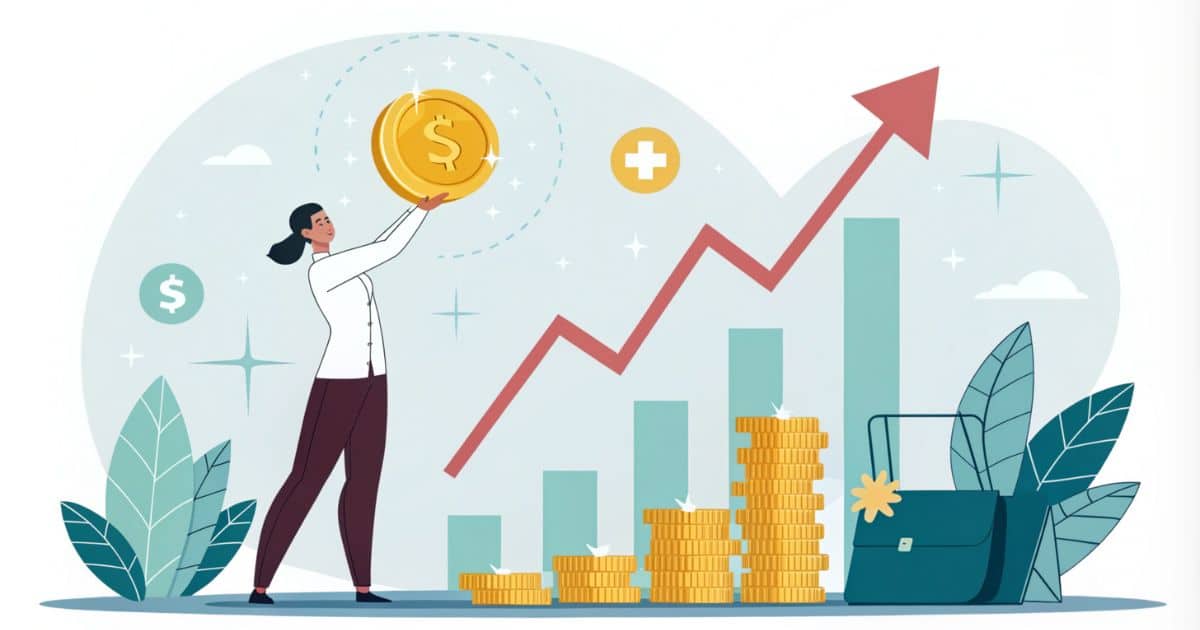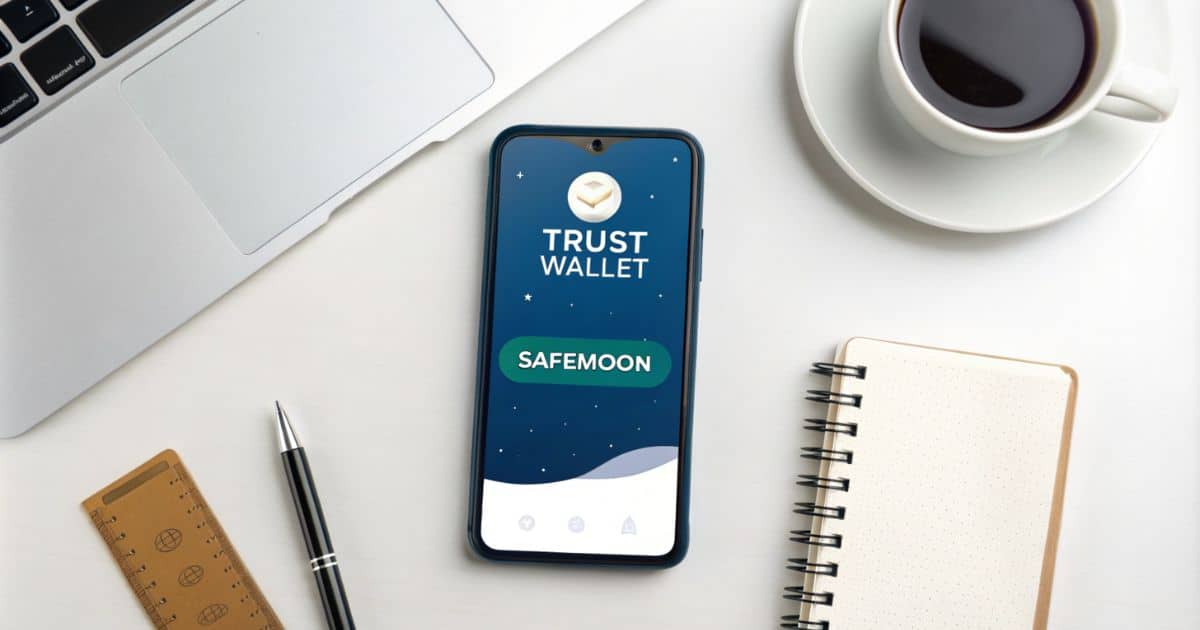Imagine looking at your wallet, full of plastic cards and crumpled bills. It’s a common sight, but have you thought about its impact on the environment? The path to financial wellness and eco-friendly money starts with realizing our spending affects more than just our bank accounts.
Sustainable personal finance is more than just a buzzword. It’s a way to make a difference. By spending in ways that care for the planet, we can also take care of our finances. It’s about making choices that help our wallets and the world.
Did you know using digital payments can cut down on paper waste? Some credit cards even offer perks for being eco-friendly. These small changes in how we handle money can make a big difference. It’s time to learn how to make our financial habits greener and secure a better future.
Key Takeaways
- Electronic payments reduce paper waste and promote eco-friendly transactions
- Sustainable credit cards offer rewards for environmentally conscious spending
- Simplifying your wallet can lead to better financial organization and savings
- Green investments are growing, with the global impact investing market expanding rapidly
- Energy-efficient home improvements can lead to long-term financial savings
Understanding Sustainable Personal Finance
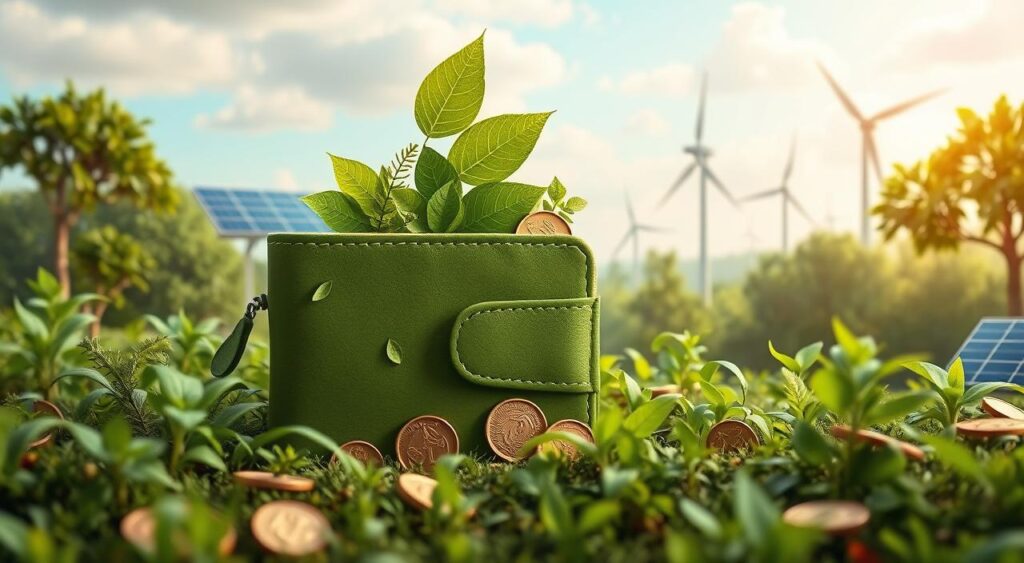
More people are now thinking about how their money choices affect the world. They want to make smart financial moves that also help the planet. This way, they aim to make a positive difference.
Definition and Importance
Sustainable personal finance means making money choices that are good for the environment. It’s about finding a balance between your financial goals and caring for the planet. This is important because sustainable investing could reach $41 trillion globally by the end of this year. This shows a big increase in people choosing to invest in a way that’s good for the planet.
Environmental Impact of Financial Decisions
Every dollar we spend or invest affects the environment. From picking a bank to buying food, our choices shape the world. Sustainable finance tries to lessen this impact by supporting companies and practices that protect our planet.
Balancing Financial Goals with Sustainability
Finding the right balance between making money and caring for the environment is essential. It’s about making choices that help your finances and the planet. This could mean investing in green companies, reducing waste, or picking products that are better for the environment.
Knowing how your money works and its effects is key. It helps you make choices that are both smart for your wallet and good for the planet. It’s not just about saving money. It’s about using it in a way that benefits the environment.
“Sustainable finance is key in moving towards a sustainable economy that focuses on making things better.”
By choosing sustainable personal finance, we can work towards a future where making money and caring for the environment go together.
The Financial Benefits of Eco-Friendly Choices
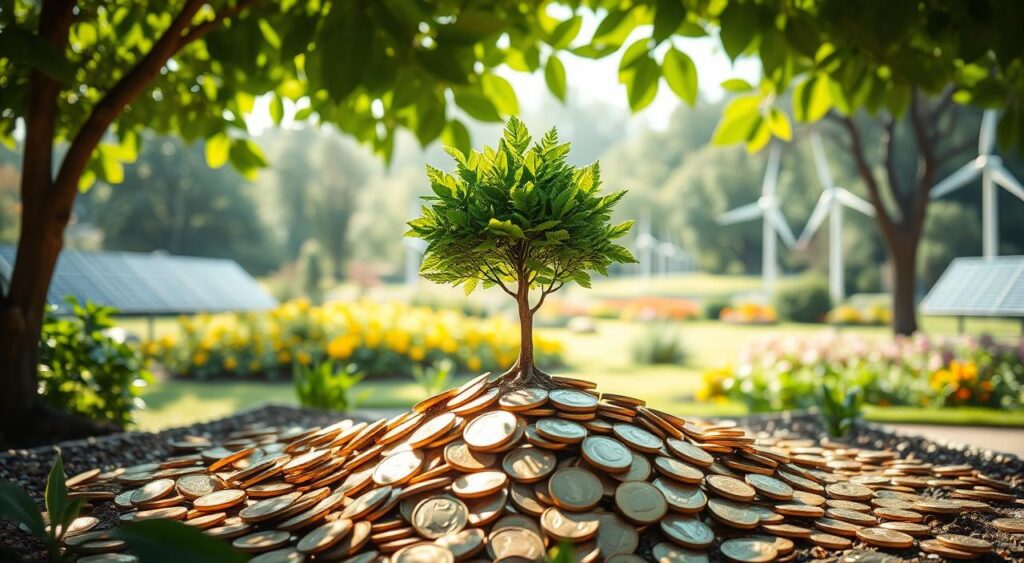
Choosing eco-friendly options can greatly improve your financial health. For example, installing solar panels in your home can save you money on electricity bills. The U.S. Department of Energy says solar power can be very cost-effective for homeowners.
Using sustainable transportation can also save you money. Electric vehicles are becoming more popular, with AAA seeing more people buying them. Studies show EV owners spend less on fuel and maintenance than those with gas cars.
Buying products that last longer can also help you save money. This approach is in line with the growing interest in sustainable products, as Forbes notes. By choosing eco-friendly options, you can:
- Lower your energy bills with ENERGY STAR appliances
- Save on fuel with electric vehicles
- Reduce waste and expenses with reusable items
- Support businesses that are good for the environment with certifications like Fair Trade and USDA Organic
These choices are good for the planet and your wallet. By adopting sustainable financial habits, you can positively impact both your finances and the environment.
Minimalist Lifestyle and Money Management

Living a minimalist lifestyle can help you save money and achieve financial freedom. It’s not just about cleaning up your space. It’s also about simplifying your finances.
Decluttering Your Wallet and Finances
Begin by organizing your financial papers and simplifying your accounts. Switch to digital options to make managing your money easier. This can help you feel less stressed and improve your financial health.
Automating your savings and bill payments can also bring peace of mind. It makes handling your finances less of a burden.
Adopting a “Less is More” Approach
Practice mindful spending to avoid buying things on impulse. Financial minimalism teaches you to think carefully about your purchases. This can save you a lot of money over time.
Choose quality over quantity. Invest in items that will bring you lasting joy and savings.
Impact on Financial Well-being
A minimalist lifestyle can greatly improve your financial health. It helps you grow your wealth over the long term. It also makes you more financially resilient.
By focusing on what’s truly important, you free up time and resources. You can enjoy life more and explore new opportunities. This way of managing wealth prioritizes well-being, freedom, and happiness.
“Simplicity is the ultimate sophistication.” – Leonardo da Vinci
By living a minimalist lifestyle, you can reach financial independence. This approach not only saves you money. It also leads to a more fulfilling and meaningful life.
Sustainable Personal Finance: Strategies for Success

Sustainable personal finance mixes financial goals with eco-friendly actions. It helps you save money and lower your carbon footprint. Let’s look at ways to make your wallet greener and secure your financial future.
First, set clear financial goals. Studies show that households with goals save more. Make a budget that fits your values, covering both personal needs and green choices.
Building an emergency fund is key. A 2021 study found 51% of Brits don’t have enough savings. Try to save 3-6 months of living costs to avoid financial shocks.
- Opt for electronic payments to reduce paper waste
- Use eco-friendly credit cards that reward sustainable purchases
- Research financial institutions that support environmental causes
Managing debt well is vital for financial health. Try the avalanche method to pay off high-interest debts fast. Also, keep an eye on your credit score to meet your long-term goals.
“Switching a pension to a green option is 21 times more effective at reducing one’s carbon footprint than a combination of giving up flying, adopting a vegetarian diet, and changing energy providers.” – Make My Money Matter
Invest in your future by saving for retirement. This not only secures your financial future but also supports green industries. Sustainable finance looks at the environment, society, and governance in investment choices.
By using these strategies, you can achieve financial success and help the planet. Stay updated on sustainable finance options and avoid greenwashing to make real changes with your money.
Green Investing: Building a Sustainable Portfolio
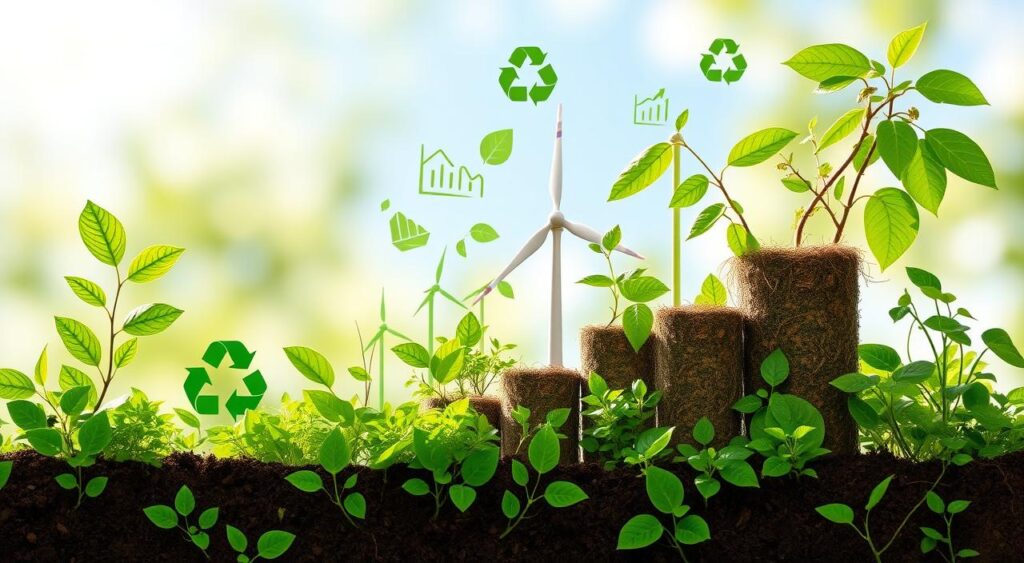
More people are now looking to invest in a way that helps the planet. This means choosing companies and projects that care about the environment and act ethically.
Eco-friendly Investment Options
There are many ways to invest in a green way:
- Renewable energy stocks
- Green bonds
- Sustainable mutual funds
- ESG-focused ETFs
These options let you support companies tackling big issues like climate change. You can also earn money while doing good. Green investing has really taken off, with $8.4 trillion in US assets using sustainable strategies by 2021.
Evaluating Companies’ Environmental Practices
When you invest ethically, it’s key to check a company’s environmental reports and carbon footprint. Look for companies with good ESG scores and a focus on being green. But watch out for greenwashing, where companies might not be as green as they say.
Long-term Benefits of Sustainable Investing
Investing with a conscience can pay off in the long run. Green investments tend to do well in changing markets and match what consumers want. A 2021 Morningstar study showed that most green funds did better than regular funds.
“Green investing combines strong financial analysis with ethical, sustainable, and impact principles,” says Peter Fotheringham, Director of Finance at the University of Dundee.
By choosing green investing, you help the planet and reach your financial goals at the same time.
Ethical Banking: Choosing Financial Institutions Wisely
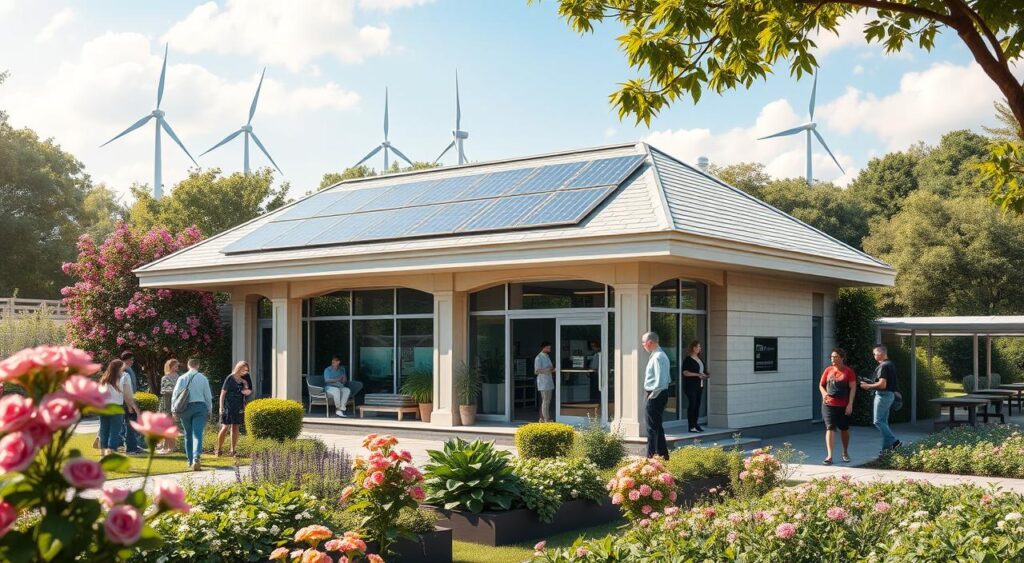
Ethical banking is becoming more popular as people want their money to match their values. A study found 103 research papers from 1991 to 2022 show more interest in green finances. This shows a big change in what people want from their money.
When picking a bank, look at its investments and if it cares about the planet. Many banks now offer green credit cards and loans that help the environment. Some even give rewards for choosing green options.
Recent data reveals:
- 31 UK current accounts were rated for ethical and environmental records
- 47 cash ISAs were evaluated for ethical and environmental ratings
- 40 mortgage providers were rated for ethical and environmental standards
These ratings help people choose banks that are good for the planet. By choosing ethical banking, you help the environment and save money. It’s a win-win for both your wallet and the planet.
“The financial services industry has experienced three major waves of transformation: ethical reforms, social responsibility, and sustainability.”
As more people want ethical banking, banks are starting to change. This is a chance for everyone to help make a difference with their money.
Mindful Budgeting for Environmental Impact

Mindful budgeting is key to sustainable finance. It helps you spend wisely and care for the planet. By choosing eco-friendly options, you can save money and help the environment.
Incorporating Sustainability into Budget Planning
Set aside money for green purchases and energy-saving upgrades. LED bulbs are a great choice. They use less energy and last longer than old bulbs.
This small change can save you money on bills and cut down on pollution.
Tracking Eco-Friendly Expenses
Keep track of your green spending. This helps you see where you save money. Using low-flow showerheads or turning off lights saves on bills.
These small steps can make a big difference over time. They help your wallet and the planet.
Balancing Financial Goals with Environmental Concerns
Good finance and green living go hand in hand. Try the “no-buy year” challenge for less spending. It helps you avoid buying things you don’t need.
“I realized I was spending four figures on carbonated drinks and Pepsi Max,” shared Mia Westrap, a participant in the no-buy challenge.
With mindful budgeting, you can plan your finances and care for the planet. It’s all about making smart choices.
Conscious Consumerism: Making Eco-Friendly Purchases
Conscious consumerism is changing how we shop. It’s about picking items that are good for the planet and people. This trend is growing fast, with sustainable product sales up nearly 20 percent from 2014.
Eco-friendly money management means thinking before buying. Ask if you’d buy it at full price and if it will make you happy for a long time. These questions help avoid buying on impulse and reduce waste.
- Shop secondhand
- Support local businesses
- Choose products with minimal packaging
- Opt for energy-efficient appliances
These choices can lower your environmental impact and save money over time. For example, energy-efficient appliances can cut utility bills. Buying secondhand also reduces waste and saves money.
Companies are noticing this shift. Many now offer sustainable options. But be careful. Some claim to be “ethically sourced” without proof. Look for certifications to ensure you’re making truly eco-friendly purchases.
Balancing cost and ethics can be tricky. Sustainable products often cost more. But their long-term value can offset the initial price. Consider durability and repairability when shopping. These factors can lead to savings down the road.
Remember, every purchase is a vote for the kind of world you want to live in. By choosing wisely, you can support a healthier planet and a stronger economy.
Energy-Efficient Home Improvements and Financial Planning
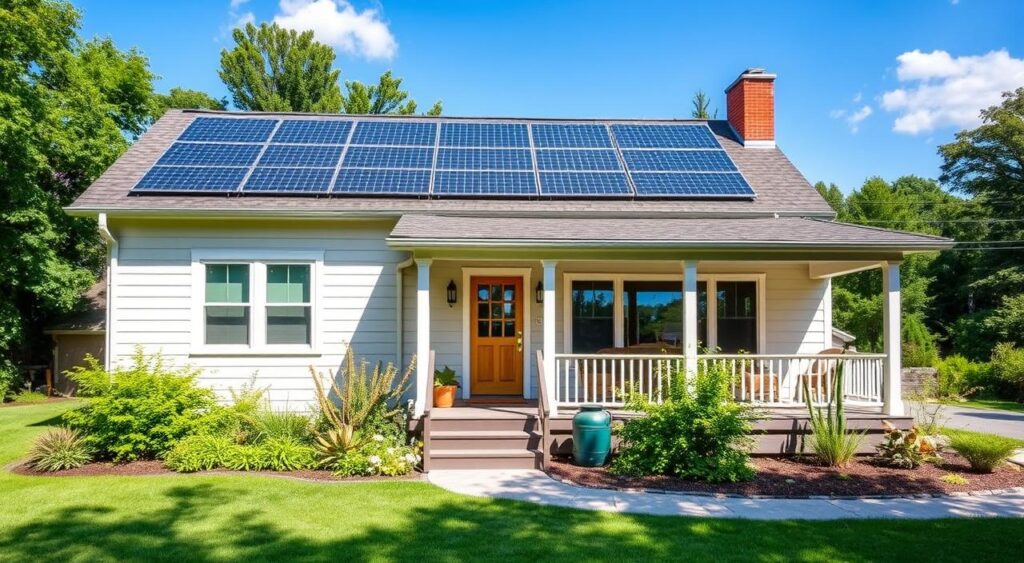
Energy-efficient home upgrades are a smart choice for saving money and the planet. They cut down on carbon emissions and save you money in the long run.
Cost-Benefit Analysis of Green Home Upgrades
It’s important to think about the costs and savings of energy-efficient upgrades. New tech can lower your bills by up to 20%. For example, dual-pane windows can save 24% in winter and 18% in summer. They might cost between $300 to $2,100 each.
Financing Options for Sustainable Home Improvements
There are many ways to finance energy-efficient home upgrades. Eco-friendly loans and green mortgages help with basic upgrades. The Inflation Reduction Act also offers big incentives, like a 30% tax credit for solar panels and up to $7,500 for electric cars.
Long-Term Savings from Energy Efficiency
Energy-efficient upgrades save money over time. Smart thermostats can save 10% each year. Tankless water heaters can save up to $108 annually for gas models. These upgrades lower your bills and can even increase your home’s value.
“Energy-efficient homes provide lower electric, gas, and water bills, making them a smart choice for sustainable personal finance.”
Adding energy-efficient upgrades to your financial plans is a smart move. It’s not just about saving money; it’s about investing in a greener future.
Conclusion
Sustainable personal finance is a key to better financial health and less harm to the environment. Over the last 100 years, sustainability has grown to include social justice. This makes it even more important in the world of finance.
The world is seeing more focus on sustainable finance. In 2022, there were 434 studies on it. This approach considers the environment, social issues, and good governance in financial choices. It helps match financial goals with sustainability goals.
Using sustainable finance has many benefits. Companies that focus on ESG can make more money. They do this by using resources better and managing well. For people, it means saving money in the long run and a safer financial future. Plus, it helps the planet.
Millennials will inherit $68 trillion in the next 20 years. Their choices are changing the finance world. By choosing sustainable finance, people can help achieve global goals. This creates a better future for everyone, financially and environmentally.
FAQ
What is sustainable personal finance?
Sustainable personal finance means making money choices that care for the planet and people. It’s about cutting waste, using eco-friendly ways, and thinking before spending.
How can eco-friendly choices benefit personal finances?
Going green can save you money in the long run. Things like energy-saving homes, green cars, and buying less can cut down on bills and spending.
What are the benefits of a minimalist lifestyle for personal finances?
Living simply can help you pay off debt and save more. It teaches you to spend wisely, clear out clutter, and match your spending with your values and goals.
What strategies can help with successful sustainable personal finance?
To succeed, use digital payments, choose eco-friendly credit cards, and set spending limits. Keep track of your spending and pick banks that share your green values.
What is green investing, and what are its benefits?
Green investing puts money into companies that care for the environment. This can lead to good returns, lower risks, and help the planet.
How can individuals choose ethical banking?
Look for banks that support green causes and offer eco-friendly products. They might have green credit cards and loans for sustainable living.
How can individuals incorporate sustainability into their budgeting?
Budget for green purchases and upgrades. Track your eco-friendly spending and focus on investments that last.
What is conscious consumerism, and how can it benefit personal finances?
Conscious consumerism means buying with thought for the planet and people. It can save money by choosing durable, energy-efficient items.
How can energy-efficient home improvements benefit personal finances?
Improving your home to save energy can cut bills and boost your home’s value. It might even get you tax breaks, even with the upfront costs.




